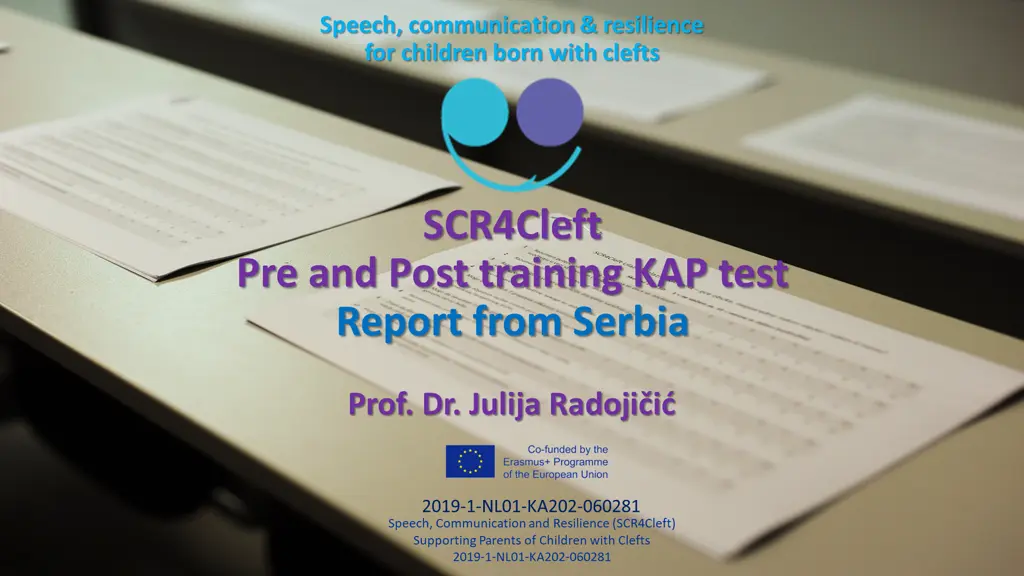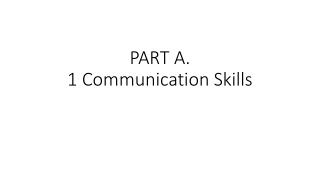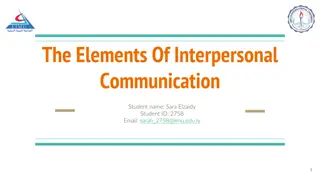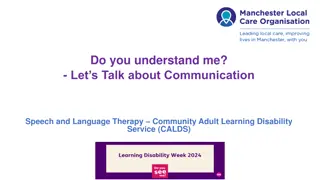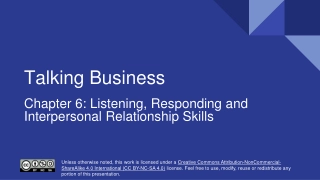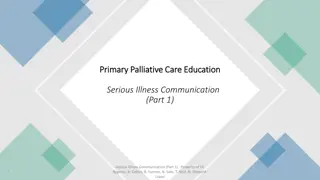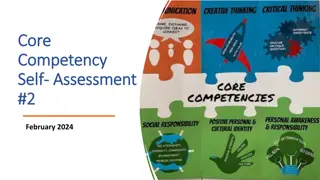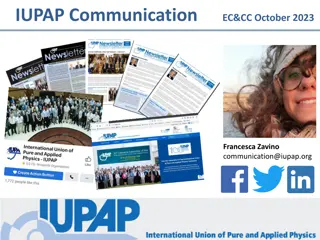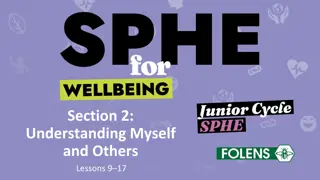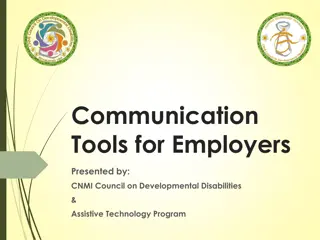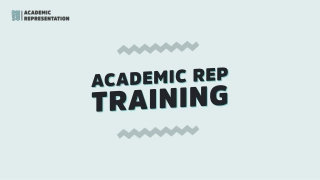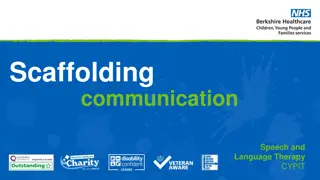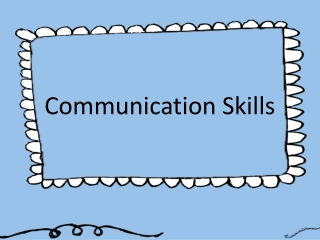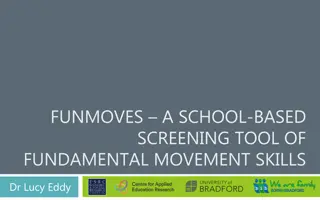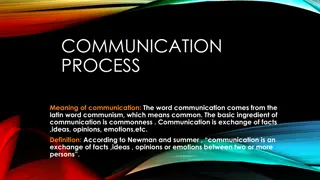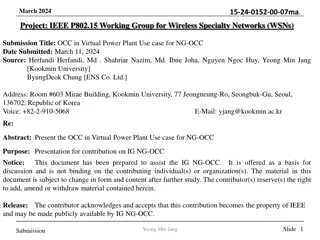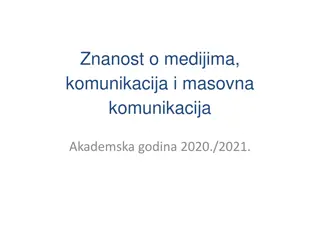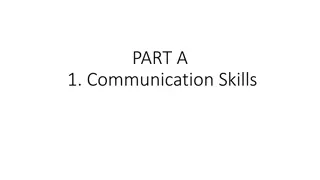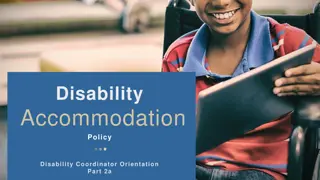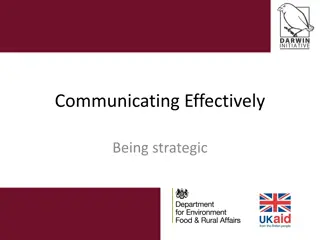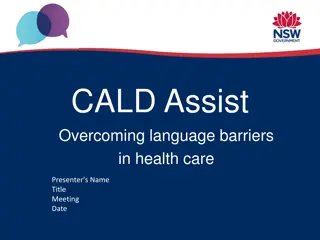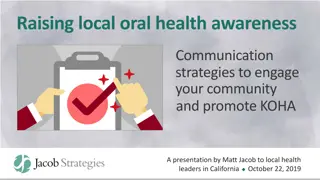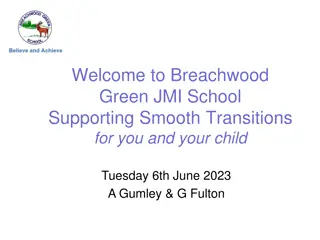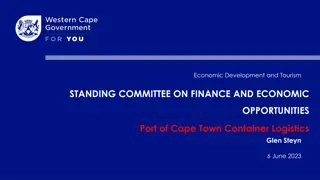Enhancing Communication Skills for Children with Clefts
This report highlights pre- and post-training KAP test results on speech, communication, and resilience for children born with clefts. The study involved 56 healthcare professionals from various disciplines, showing significant improvement in knowledge and understanding after training. The findings emphasize the importance of interdisciplinary collaboration in supporting children with clefts and their families.
Download Presentation
Please find below an Image/Link to download the presentation.
The content on the website is provided AS IS for your information and personal use only. It may not be sold, licensed, or shared on other websites without obtaining consent from the author. Download presentation by click this link. If you encounter any issues during the download, it is possible that the publisher has removed the file from their server.
Presentation Transcript
Speech, communication & resilience for children born with clefts SCR4Cleft Pre and Post training KAP test Report from Serbia Prof. Dr. Julija Radoji i 2019-1-NL01-KA202-060281 Speech, Communication and Resilience (SCR4Cleft) Supporting Parents of Children with Clefts 2019-1-NL01-KA202-060281
In total, 56 healthcare professionals participated in the plot study out of which: - 3 private clinic speech therapists - 5 public clinic speech therapists - 6 otorhinolaryngologists - 4 psychologists - 10 nurses - 25 orthodontists - 3 dental technicians
Speech, communication & resilience for children born with clefts SCR4Cleft Pre and Post training KAP test General questions Question I understand some of the potential challenges faced by children with clefts regarding speech and appearance I have an understanding of the treatment needs of children with clefts I understand why it is important for different disciplines to work together in treating children with clefts Pre training 8.70 Post training Significance 9.66 0.64 1.48 <0.001 9.34 9.29 9.82 9.86 1.18 1.20 0.54 0.48 <0.01 <0.01 Mean Standard deviation T-test Statistically significantly better post-training scores were achieved on all questions 2019-1-NL01-KA202-060281 Speech, Communication and Resilience (SCR4Cleft) Supporting Parents of Children with Clefts 2019-1-NL01-KA202-060281
Speech, communication & resilience for children born with clefts SCR4Cleft Pre and Post training KAP test Questions about communication Question I can list 3 skills of someone who is a good listener I can name 3 barriers to effective communication I can explain the differences between speech, expressive language and understanding/receptive language I can identity how a cleft might affect communication in young children aged 2-5 years I can explain ways of laying the foundations for good communication skills in young children Pre training 7.14 7.55 6.38 Post training 8.96 8.91 8.77 Significance <0.001 <0.001 <0.001 2.02 2.06 2.39 1.32 1.39 1.35 7.02 5.30 Mean Standard deviation 8.84 8.39 2.39 2.51 1.73 1.81 <0.001 <0.001 T-test Statistically significantly better post-training scores were achieved on all questions 2019-1-NL01-KA202-060281 Speech, Communication and Resilience (SCR4Cleft) Supporting Parents of Children with Clefts 2019-1-NL01-KA202-060281
Speech, communication & resilience for children born with clefts SCR4Cleft Pre and Post training KAP test Questions about knowledge of the origin of speech and developmental problems that affect speech Question I can list 3 of the important building blocks which underpin a baby s speech and language development I understand how we produce normal speech, including the role of the soft palate I can name four signs of delayed speech and language development I can describe 3 characteristics of understanding and expression in a typically developing child of 2 3 years I can describe 3 characteristics of understanding and expression in a typically developing child of 4 5 years I can recognise and name the articulation errors associated with cleft palate I can recognise and name the articulation errors associated with cleft palate I can recognise speech errors indicative of Velopharyngeal Insufficiency Pre training 6.57 Post training Significance 8.29 1.87 2.53 <0.001 8.18 6.04 6.88 9.16 8.54 8.64 1.92 2.52 2.29 1.39 1.88 1.78 <0.01 <0.001 <0.001 6.82 8.64 2.33 1.68 <0.001 6.61 6.59 6.18 Mean Standard deviation 8.50 8.61 8.13 2.57 2.61 2.57 1.75 1.63 2.35 <0.001 <0.001 <0.001 T-test Statistically significantly better post-training scores were achieved on all questions 2019-1-NL01-KA202-060281 Speech, Communication and Resilience (SCR4Cleft) Supporting Parents of Children with Clefts 2019-1-NL01-KA202-060281
Speech, communication & resilience for children born with clefts SCR4Cleft Pre and Post training KAP test Questions about knowing the principles and possible techniques to help children improve their speech function Question I can list 3 principles of how to support speech and language development in young children aged 0- 3 years I can name 3 ways of helping a 2 year old child with a cleft palate make sounds I can describe 3 ways to help a child with delayed language develop words or put words together I can list 4 strategies to support speech and language development in young children aged 4+ years I can list 4 ideas to help to improve speech in children affected by cleft aged 4 + years I know what to avoid doing when a child has a speech problem I can list what speech difficulties can and can t be treated with speech therapy Pre training 5.02 Post training Significance 7.98 2.23 2.55 <0.001 4.43 4.71 7.55 7.79 2.40 2.58 2.43 2.28 <0.001 <0.001 4.57 7.82 2.43 2.22 <0.001 4.52 5.18 4.89 Mean Standard deviation 7.88 7.91 7.77 2.37 2.66 2.81 2.19 2.36 2.46 <0.001 <0.001 <0.001 T-test Statistically significantly better post-training scores were achieved on all questions 2019-1-NL01-KA202-060281 Speech, Communication and Resilience (SCR4Cleft) Supporting Parents of Children with Clefts 2019-1-NL01-KA202-060281
Speech, communication & resilience for children born with clefts SCR4Cleft Pre and Post training KAP test Questions about resilience and resilience improvement Question I can define the term resilience I can identify the additional challenges that a cleft can pose to positive adjustment in young children I know how to help young children affected by cleft to deal effectively with negative reactions from others I can describe the disadvantages of being over-protective towards children affected by a cleft 6.07 Pre training 4.50 5.52 Post training 8.77 8.21 Significance <0.001 <0.001 2.86 2.34 1.94 2.03 5.45 8.52 2.21 1.86 <0.001 8.52 2.16 1.71 <0.001 T-test Mean Standard deviation Statistically significantly better post-training scores were achieved on all questions 2019-1-NL01-KA202-060281 Speech, Communication and Resilience (SCR4Cleft) Supporting Parents of Children with Clefts 2019-1-NL01-KA202-060281
Speech, communication & resilience for children born with clefts SCR4Cleft Pre and Post training KAP test Questions about knowledge of the origin of speech and developmental problems that affect speech Question I can list at least four ways in which parents can promote resilience in their children I understand how to promote a healthy relationship with social media in school age children I can describe at least 4 effective stress management techniques for young children I understand why it is helpful for parents of children affected by cleft to improve their resilience to stress I can describe at least 4 techniques for increasing resilience in parents of children with cleft I can describe effective ways that parents can use to deal with unwanted questions and negative reactions from others directed at their child I can describe at least 4 ways adults can use to manage stress effectively I can describe why it is important to replace unhelpful ways of thinking with more positive thoughts Pre training 4.59 5.73 4.79 7.27 Post training 8.59 8.55 8.34 9.27 Significance <0.001 <0.001 <0.001 <0.001 2.39 2.42 2.48 2.11 1.49 1.56 1.89 1.02 4.54 5.38 8.21 8.52 2.40 2.52 1.83 1.76 <0.001 <0.001 5.63 6.82 8.54 9.16 2.63 2.29 1.80 1.40 <0.001 <0.001 Mean Standard deviation T-test Statistically significantly better post-training scores were achieved on all questions 2019-1-NL01-KA202-060281 Speech, Communication and Resilience (SCR4Cleft) Supporting Parents of Children with Clefts 2019-1-NL01-KA202-060281
Speech, communication & resilience for children born with clefts SCR4Cleft Pre and Post training KAP test Questions about resilience, media and public networks Question I can describe the benefits of an effective network of social support I can identify the risks to wellbeing associated with heavy social media use Mogu da navedem merodavne izvore informacija i podr ke za roditelje dece sa rascepom Pre training 6.14 5.89 5.34 Mean Standard deviation Post training Significance 8.77 1.45 8.91 1.49 8.39 2.09 2.32 2.51 2.71 <0.001 <0.001 <0.001 T-test Statistically significantly better post-training scores were achieved on all questions 2019-1-NL01-KA202-060281 Speech, Communication and Resilience (SCR4Cleft) Supporting Parents of Children with Clefts 2019-1-NL01-KA202-060281
SCR4Cleft Pre and Post training KAP test 2019-1-NL01-KA202-060281 Speech, Communication and Resilience (SCR4Cleft) Supporting Parents of Children with Clefts 2019-1-NL01-KA202-060281 Speech, communication & resilience for children born with clefts
